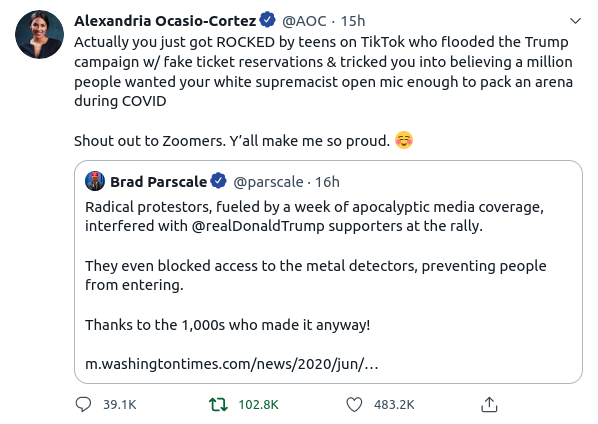The politicization of online fandoms is always weird. Most fandoms (usually) have no intrinsic political valence, and indeed, a common strong affinity for an apolitical genre can make strange allies, bringing together people of very different politics.
1/
1/
I remember going to Dungeons and Dragons club in Toronto in the 1980s and bailing early to go to anti-nuclear proliferation protests, to the absolutely shock and dismay of the far-right types who found their way into the hobby through wargaming.
2/
2/
This makes for some bitter splits when a majority (or large minority) of a fandom decides to politicize. The closest I came to quitting SFWA was when the board unwisely promulgated a loyalty oath stating "respect for intellectual property" was a condition of membership.
3/
3/
(Don& #39;t worry, that& #39;s no longer the case and the people behind it are not active in the org anymore. You can still be an sf writer even if you hate patent trolls, copyfraudsters, or the toxic business-model of Elsevier)
4/
4/
As the fight for racial justice in America has heated up and moved back onto the streets in the highest-possible-stakes way, an unlikely fandom has thrown its support behind the cause: K-Pop Stans (AKA megafans of South Korean pop music).
5/
5/
Earlier this month, there was a massive flood of K-Pop "fancams" (short video clips of musical performances) in far-right hashtags, and to the snitch-line set up by Dallas police to rat out protesters.
#solidarity">https://pluralistic.net/2020/06/03/white-nationalist-pogrom/ #solidarity
6/">https://pluralistic.net/2020/06/0...
#solidarity">https://pluralistic.net/2020/06/03/white-nationalist-pogrom/ #solidarity
6/">https://pluralistic.net/2020/06/0...
At the time, some people were skeptical of K-Pop stans& #39; commitment to justice; I heard from several people who& #39;d been targeted by K-Pop harasser mobs that flooded queer and racialized online spaces in precisely the same way.
7/
7/
At the time, I thought K-Pop fandom was probably undergoing a politicization comparable to other fandoms - like the purging of Nazi elements from the punk scene and the emergence of an explicitly anti-authoritarian, queer, leftist character to a genre of music and fandom.
8/
8/
I think I was right. Yesterday, Trump held a rally in Tulsa, OK. In advance of that rally, his campaign manager boasted of over 1,000,000 RSVPs and the campaign planned for massive outdoor overspill areas with jumbotrons.
9/
9/
But when the doors opened, only 6,000 people were there, enough to leave the 19,000 person hall - a true #EmptysburgAddress.
The Trump campaign (predictably) blamed it on fear of antifa supersoldiers who& #39;d scared off his million+ throng.
10/
The Trump campaign (predictably) blamed it on fear of antifa supersoldiers who& #39;d scared off his million+ throng.
10/
But what ACTUALLY happened is that Gen-Z K-Pop stans and Tiktokkers had sent a million fake signups to the RSVP system, flooding it. That& #39;s why they were expecting a million people.
https://twitter.com/AOC/status/1274499021625794565
11/">https://twitter.com/AOC/statu...
https://twitter.com/AOC/status/1274499021625794565
11/">https://twitter.com/AOC/statu...
(As to why only 6,000 showed: Trump isn& #39;t that popular, and his base skews old and unwell and understand that going to a rally during a coronavirus pandemic could kill them)
12/
12/
The politicization of K-Pop stans has a really interesting recent historical antecedent: #Anonymous. The movement had its origins in 4chan& #39;s /b/ forum, a notorious source of online harassment and anarchic "fun."
13/
13/
But during #Occupy and the #ArabSpring, a large plurality of Anonymous participants became explicitly politicized and declared the movement to have an explicit political character.
14/
14/
The path to that political character is complicated, with detours through a Scientology lawsuit and other odd alleyways, but that& #39;s where they ended up.
15/
15/
The very best person to read on this is the cyber-anthropologist @BiellaColeman. Here& #39;s my review of her 2014 must-read on Anonymous, "Hacker, Hoaxer, Whistleblower, Spy":
https://www.spectator.co.uk/article/the-anonymous-ghost-in-the-machine
16/">https://www.spectator.co.uk/article/t...
https://www.spectator.co.uk/article/the-anonymous-ghost-in-the-machine
16/">https://www.spectator.co.uk/article/t...
But after Biella& #39;s book came out, 4chan kept going. The rump of 4chan/b people who didn& #39;t want to follow Anonymous& #39;s new politics became...Donald Trump& #39;s authoritarian online footsoldiers.
17/
17/
And there WERE homophobic and racist K-Pop stan raids in the past. Progressive politics were not a condition of K-Pop fandom membership (until now). So there& #39;s probably a rump of bitter, vicious racist trolls who have mastered the same tactics we& #39;re celebrating today.
18/
18/
That said: as @hyunsuinseoul documents in a fantastic @TheKoreaHerald piece on K-Pop fandom in Korea and abroad, the US K-Pop scene is pretty queer and pretty racially diverse.
http://m.koreaherald.com/view.php?ud=20200612000721
19/">https://m.koreaherald.com/view.php...
http://m.koreaherald.com/view.php?ud=20200612000721
19/">https://m.koreaherald.com/view.php...
And K-Pop& #39;s fringe status in US culture has welded together the fandom in a movement that cut its teeth flooding I Heart Radio request lines.
20/
20/

 Read on Twitter
Read on Twitter


